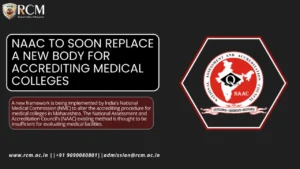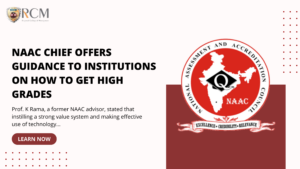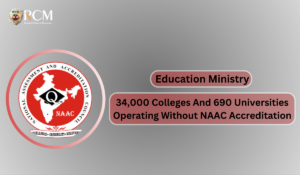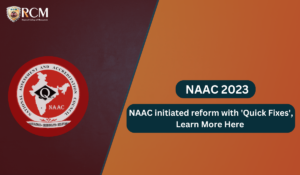A new framework is being implemented by India’s National Medical...
Read MoreIndia's Leading Education Provider
naac accreditation
Home ► RCM Insights ► rcm-legacy ► Recognitions, Accreditations & Approvals ► ACCREDITED BY NAAC
Regional College of Management (RCM),was established on June 30, 1982 with the recognition of the Govt. of AICTE. Though as a college it has only 29 Years of existence, but as an Institution, it has 50 Years of experience in promoting management art form.
Curricular Aspect:
Board of Studies:
The Board of Studies is the basic constituent of the academic system of an autonomous college. It frames the syllabi for various courses, reviewing and updating syllabi from time to time, introducing new courses of study, determining details of continuous assessment, recommending panels of examiners under the Trimester system, etc. Preparation for a course to be introduced in the next academic session starts in the month of October of the preceding session with meetings of Board of Studies. The Board of Studies formulates the idea of opening a new course into a proposal with all necessary details such as objectives, eligibility, course content and fees structure. Such proposal is forwarded to the Academic Council.
An array of soft skill development activities are part of the programs. The activities focus on team building and also infuse qualities like leadership, negotiation skills and creativity. As a part of the Personality Development course, students are being provided with inputs in weekly soft skill classes. Industry visits have been incorporated into the course curriculum. Participation and organization of International, National and class room seminars and corporate fairs facilitate team building leadership skills and interpersonal effectiveness. The website of the institute indicates the purpose of internal communication. The website features the institute’s infrastructure facilities, qualifications and experience of faculty members, accolades won by the students, faculty and the institute, display of program rules and regulations, display of syllabus and code of conduct for students
Institutional Accreditation:
Course-curriculum:
The frequency of syllabus revision is once in a year and Board of Studies brings about need based changes in the curriculum despite the rigidities of the system. Expert from industry , academia from outside and faculty members of RCM come together in a live workshop for designing an effective syllabus for MBA program. The first part of the workshop focuses on reviewing the elements that should be in a syllabus as covered in the Syllabus Template. Specifically, participants integrate campus-wide and course-specific outcomes into their syllabi.
All faculty members create and/or revise their syllabi for their courses to address the elements outlined on the syllabus template. The second part of the syllabus workshop engages participants in reviewing and evaluating sample syllabi in order to see what they might want to do on their own syllabi. Specifically, participants discuss the format and languages used in various syllabi, as well as evaluate how well the syllabi would incorporate the contemporary issues.
A new syllabi at par with the syllabus of any leading B-Schools of the country would be the outcome of this workshop. The final syllabus is prepared and placed in the Board of Studies. It is then presented by the Dean in the Academic Council. The recommendations of the Academic council are taken care of and then a syllabus is duly organized as the final document. The final syllabus is then sent to the affiliating university, the Biju Patnaik University of Technology (BPUT) for approval.
News & Article
NASSCOM 2022 Bhubaneswar Showcases Tech Innovation
Prof. K Rama, a former NAAC advisor, stated that instilling...
Read MoreNAAC Accreditation in India: A National Educational Challenge
The NEP anticipates that during the next 15 years, all...
Read MoreNAAC initiated reform with ‘Quick Fixes’. Learn More Here
Last month, NAAC Chairman Bhushan Patwardhan resigned after highlighting ‘problems’...
Read MoreContact Info
Address:
Plot No. GD 2/12 & 13 Chakadola Vihar, Chandrasekharpur, Bhubaneswar-751023
City Office:
Directors Chamber’s, #203, Plot No. B15, 2nd Floor, Swash lane, Sahidnagar, Bhubaneswar - 751007, Odisha
Mobile:
+91 90900 80801
Email:
Quick Links
Programs
Recent Posts
Regional College of Management (RCM), Bhubaneswar, the first management college in Odisha, was established in 1982. The college has been approved under section 2(f) and 12 (b) of the UGC Act. The institute has been conferred the status by UGC in the year 2009. It is the first management institute in Eastern India conferred by the University Grants Commission. The institute since its inception, developed immensely in all areas of management education.
Newsletter
Get all latest content delivered to your Email a few times a month.
